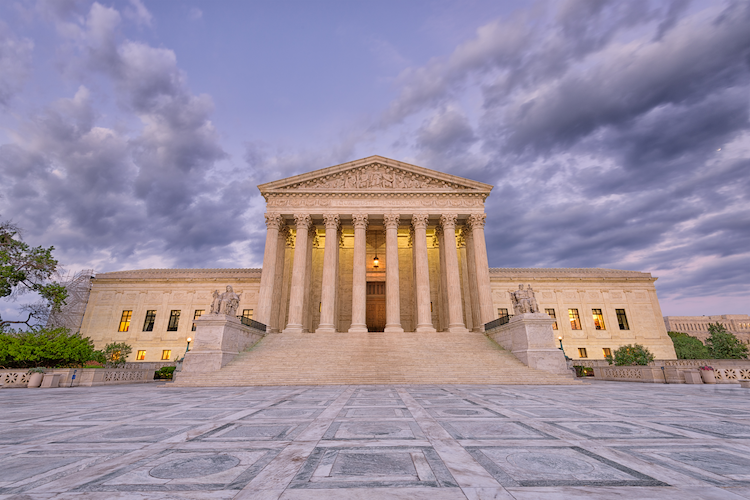Supreme Court Hears Oral Arguments in Four Cases to Start December Sitting

The U.S. Supreme Court returned to the bench on December 2, 2024. In the first week of their December sitting, the justices heard oral arguments in four cases. The issues before the Court ranged from the FDA’s refusal to authorize new vaping products to healthcare for transgender minors.
Below is a brief summary of the cases and the legal issues before the Court:
Food and Drug Administration v. Wages and White Lion Investments, LLC: The Family Smoking Prevention and Tobacco Control Act requires entities to obtain authorization from the Food and Drug Administration (FDA) before introducing a new tobacco product into interstate commerce. The FDA may grant such authorization only if the applicant shows, among other things, that the marketing of the product would be “appropriate for the protection of the public health.” In this case, the FDA denied respondents’ applications for authorization to market new e-cigarette products because they had failed to show that marketing the products would be appropriate for the protection of the public health. The Fifth Circuit broke with other federal courts of appeal in setting aside FDA’s denial orders as arbitrary and capricious. The question now before the justices is “[w]hether the court of appeals erred in setting aside FDA’s denial orders as arbitrary and capricious.”
United States v. Miller: The Bankruptcy Code, 11 U.S.C. 544(b)(1), provides that “the trustee may avoid any transfer of an interest of the debtor in property . . . that is voidable under applicable law by a creditor holding an unsecured claim that is allowable under” the Code. Elsewhere, the Code abrogates the sovereign immunity of all governmental units “to the extent set forth in this section with respect to” various sections of the Code, including Section 544. The Tenth Circuit Court of Appeals joined a circuit split in holding that Section 106(a)(l) permits a bankruptcy trustee to avoid a debtor’s tax payment to the United States under Section 544(b), even though no actual creditor could have obtained relief outside of bankruptcy in light of sovereign immunity, the Supremacy Clause, and the Appropriations Clause. The specific question before the justices is: “Whether a bankruptcy trustee may avoid a debtor’s tax payment to the United States under Section 544(b) when no actual creditor could have obtained relief under the applicable state fraudulent-transfer law outside of bankruptcy.”
Republic of Hungary v. Simon: The families of Holocaust survivors filed suit against the Republic of Hungary. A foreign sovereign is generally immune from suit in domestic courts, subject to the specific exceptions of the Foreign Sovereign Immunities Act. Under the expropriation exception, claims involving rights in property taken in violation of international law may be heard if “property or any property exchanged for such property” has a commercial nexus with the United States. Pursuant to 28 U.S.C. § 1605(a)(3), the property or its proceeds must be either “present in the United States in connection with a commercial activity” or “owned or operated by an agency or instrumentality of the foreign state and that agency or instrumentality is engaged in a commercial activity in the United States.” The circuit courts are divided regarding the showing required to meet the commercial nexus requirement. The Court must now decide: (1) Whether historical commingling of assets suffices to establish that proceeds of seized property have a commercial nexus with the United States under the expropriation exception; (2) whether a plaintiff must make out a valid claim that an exception to the FSIA applies at the pleading stage, rather than merely raising a plausible inference; and (3) whether a sovereign defendant bears the burden of producing evidence to affirmatively disprove that the proceeds of property taken in violation of international law have a commercial nexus with the United States under the expropriation exception to the FSIA.
United States v. Skrmetti: The case involves the constitutionality of Tennessee Senate Bill 1 (SBl), which prohibits all medical treatments intended to allow “a minor to identify with, or live as, a purported identity inconsistent with the minor’s sex” or to treat “purported discomfort or distress from a discordance between the minor’s sex and asserted identity.” The justices must specifically decide whether the Tennessee law violates the Equal Protection Clause of the Fourteenth Amendment.
Decisions in all of the cases are expected before the term ends in June/July 2025. Please check back for updates.
Previous Articles
SCOTUS Decision in Bowe v. United States Is First of the 2026 Term
by DONALD SCARINCI on February 5, 2026
In Bowe v. United States, 607 U.S. ___ (2026), the U.S. Supreme Court held that Title 28 U.S.C. § ...
SCOTUS Rules State Can’t Immunize Parties from Federal Civil Liability
by DONALD SCARINCI on January 29, 2026
In John Doe v. Dynamic Physical Therapy, LLC, 607 U.S. ____ (2025) the U.S. Supreme Court held that...
Supreme Court to Address Racial Discrimination in Jury Selection
by DONALD SCARINCI onWhile the U.S. Supreme Court has concluded oral arguments for the year, it continues to add cases t...
The Amendments
-
Amendment1
- Establishment ClauseFree Exercise Clause
- Freedom of Speech
- Freedoms of Press
- Freedom of Assembly, and Petitition
-
Amendment2
- The Right to Bear Arms
-
Amendment4
- Unreasonable Searches and Seizures
-
Amendment5
- Due Process
- Eminent Domain
- Rights of Criminal Defendants
Preamble to the Bill of Rights
Congress of the United States begun and held at the City of New-York, on Wednesday the fourth of March, one thousand seven hundred and eighty nine.
THE Conventions of a number of the States, having at the time of their adopting the Constitution, expressed a desire, in order to prevent misconstruction or abuse of its powers, that further declaratory and restrictive clauses should be added: And as extending the ground of public confidence in the Government, will best ensure the beneficent ends of its institution.





